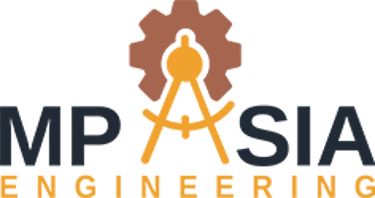What should I be aware of before doing a CNC grinding project? What are some things I need to look out in a company before selecting them to do our CNC grinding project?
This article is for those that want to know factors to consider before doing and selecting a vendor to do CNC grinding project. This articles looks into what the customer need to be aware like requirements, materials, machine, grinding wheel, parameters and programming, etc. It also takes about important factors to look in a vendor like expertise & experience, equipment's and technology, quality assurance, material knowledge, capacity and scalability, and more.
CNC GRINDING SINGAPORE
Embarking on a CNC grinding project requires careful planning and consideration to ensure success. So MP Asia Engineering Team has come up with a list of key factors to know and prepare for before starting a CNC grinding project. These factors are Understand the Project Requirements, Material Considerations, Grinding Machine Selection, Grinding Wheel Selection, CNC Programming and Setup, Grinding Parameters, Quality Control and Inspection, Safety and Maintenance, Cost and Time Estimation, Industry Standards and Compliance and Collaboration with Experts
These are usually factors that most CNC precision engineering companies keep a look out for in their operations. So if you are a customers a business knowing these factors can give you such clarity so you can navigate to production success. Let's take a look at what exactly we need to consider at each factor while doing a CNC Grinding project.


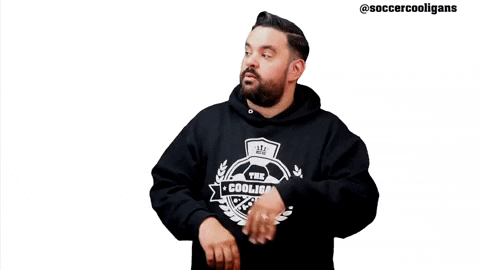

7) Customer Service and Communication
Responsiveness: Evaluate how quickly and effectively they respond to inquiries and address concerns.
Collaboration: Look for a company that is willing to work closely with you to understand your requirements and provide tailored solutions.
Project Management: Ensure they have a dedicated project manager or point of contact to oversee your project.


1) Understand the Project Requirements
Part Specification: Clearly define the dimensions, tolerances, surface finish, and material of the part.
Volume: Determine whether the project is for prototyping, low-volume, or high-volume production.
Application: Understand the end-use of the part (e.g., aerospace, automotive, medical) to ensure compliance with industry standards.
4) Grinding Wheel Selection
Abrasive Material: Select the right abrasive (e.g., aluminum oxide, silicon carbide, diamond, CBN) based on the workpiece material.
Grit Size: Choose the appropriate grit size for the desired surface finish and material removal rate.
Bond Type: The bond (e.g., vitrified, resin, metal) affects wheel durability and performance.
Wheel Dressing: Plan for regular dressing of the wheel to maintain its shape and cutting efficiency.
5) CNC Programming and Setup
CAD/CAM Software: Use CAD/CAM software to design the part and generate the CNC program.
Tool Path Optimization: Ensure the grinding path is optimized for efficiency and accuracy.
Fixturing and Workholding: Design or select appropriate fixtures to securely hold the workpiece during grinding.
Machine Calibration: Calibrate the CNC machine to ensure accuracy and repeatability.
Let's sum up these 11 pointers. So before starting a CNC grinding project, if you are ensure these essentials below you can ensure a successful CNC grinding project with high-quality results.
Clearly define the project requirements.
Select the right materials, machine, and grinding wheel.
Optimize CNC programming and grinding parameters.
Implement robust quality control and safety measures.
Plan for costs, time, and compliance with industry standards.
1) Technical Expertise and Experience
Industry Experience: Look for a company with a proven track record in CNC grinding, especially in your industry (e.g., aerospace, automotive, medical).
Specialization: Check if they specialize in the type of grinding you need (e.g., surface grinding, cylindrical grinding, centerless grinding).
Skilled Workforce: Ensure they have experienced CNC programmers, operators, and quality control personnel.
2) Equipment and Technology
Modern Machinery: Verify that the company uses advanced CNC grinding machines capable of handling your project’s precision and complexity.
Automation: Check if they offer automated solutions (e.g., robotic loading/unloading) for high-volume or repetitive tasks.
Tooling and Accessories: Ensure they have a wide range of grinding wheels, fixtures, and tooling to handle different materials and geometries.
3) Quality Assurance
Certifications: Look for certifications like ISO 9001, AS9100 (aerospace), or ISO 13485 (medical devices) to ensure they follow strict quality standards.
Inspection Capabilities: Check if they have advanced inspection tools (e.g., CMMs, surface profilometers) to verify part dimensions and surface finish.
Process Control: Ensure they have robust quality control processes in place, including in-process monitoring and post-process inspection.
4) Material Knowledge
Material Expertise: Confirm that the company has experience working with the specific materials you need (e.g., metals, ceramics, composites).
Heat and Stress Management: Ensure they understand how to handle heat-sensitive materials to avoid warping or damage during grinding.
By thoroughly evaluating these factors, you can choose a reliable partner who will deliver high-quality results for your CNC grinding project. Here is a summary on what you need to prioritize from the points above.
Technical expertise and experience.
Advanced equipment and quality assurance processes.
Material knowledge and production capacity.
Transparent pricing and excellent customer service.
A strong reputation and commitment to sustainability.
2) Material Considerations
Material Type: Identify the material to be ground (e.g., steel, aluminum, titanium, ceramics, composites) as it affects the choice of grinding wheel and parameters.
Material Hardness: Harder materials require specialized grinding wheels and slower speeds to avoid excessive wear or damage.
Heat Sensitivity: Some materials are prone to heat damage, so cooling and grinding parameters must be carefully controlled.
3) Grinding Machine Selection
Type of Grinding: Choose the appropriate grinding method (e.g., surface grinding, cylindrical grinding, centerless grinding) based on the part geometry and requirements.
Machine Capabilities: Ensure the CNC grinding machine has the necessary precision, power, and axis movements for the project.
Automation Level: Decide if additional automation (e.g., robotic loading/unloading) is needed for efficiency.
Now let's look at what you need to do look for as a customer before picking your CNC Grinding vendor. Usually at MP Asia Engineering we have a ready-made profile to showcase customers with all these factors addresses so it saves them the time to ask all these questions. Many CNC Engineering companies do offer a profile / deck these days for customers with most of these questions addressed.
Choosing the right company for your CNC grinding project is critical to ensuring quality, efficiency, and cost-effectiveness. So here are key factors to consider when evaluating a company for CNC grinding services (you can look for these factors in the company profile/deck or ask the vendors to quality them.
5) Capacity and Scalability
Production Capacity: Assess their ability to handle your project volume, whether it’s prototyping, low-volume, or high-volume production.
Lead Times: Check if they can meet your deadlines without compromising quality.
Scalability: Ensure they can scale up production if your needs grow in the future.
6) Cost and Pricing
Transparent Pricing: Look for a company that provides clear and detailed cost estimates, including setup, tooling, and per-part costs.
Value for Money: Compare pricing with the quality and services offered to ensure you’re getting good value.
Hidden Costs: Ask about potential additional costs (e.g., rush fees, material waste disposal).
8) Reputation and References
Client Reviews: Check online reviews, testimonials, or case studies to gauge their reputation.
References: Ask for references from past clients, especially those in your industry, to verify their performance and reliability.
Industry Recognition: Look for awards or recognitions that highlight their expertise and commitment to quality.
6) Grinding Parameters
Speed and Feed Rates: Set the correct spindle speed (RPM) and feed rate based on the material and grinding wheel.
Depth of Cut: Determine the optimal depth of cut to balance material removal and wheel wear.
Coolant Usage: Use the appropriate coolant to reduce heat, prevent thermal damage, and improve surface finish.
7) Quality Control and Inspection
Measurement Tools: Use precision measuring tools (e.g., micrometers, CMMs, surface profilometers) to verify part dimensions and surface finish.
In-Process Monitoring: Implement in-process monitoring to detect and correct deviations in real-time.
Post-Process Inspection: Conduct thorough inspection after grinding to ensure the part meets specifications.
8) Safety and Maintenance
Safety Protocols: Follow safety guidelines for operating CNC grinding machines, including wearing protective gear and ensuring proper machine guarding.
Machine Maintenance: Regularly maintain the CNC grinding machine to prevent breakdowns and ensure consistent performance.
Wheel Inspection: Check grinding wheels for cracks or wear before use to avoid accidents.
9) Cost and Time Estimation
Budgeting: Estimate the costs of materials, machine time, labor, and tooling.
Lead Time: Plan for setup, programming, and production time to meet deadlines
Waste Management: Account for material waste and disposal costs, especially when grinding hazardous materials.
10) Industry Standards and Compliance
Regulatory Requirements: Ensure the project complies with industry standards (e.g., ISO, AS9100 for aerospace, ISO 13485 for medical devices).
Documentation: Maintain detailed records of the grinding process, parameters, and inspection results for traceability.
11) Collaboration with Experts
Consultation: Work with experienced CNC grinding professionals or suppliers for advice on machine selection, wheel choice, and process optimization.
Training: Ensure operators and programmers are trained in CNC grinding techniques and safety practices.
9) Location and Logistics
Proximity: Consider the company’s location relative to your operations to minimize shipping costs and lead times.
Shipping and Handling: Ensure they have experience in safely packaging and shipping precision-ground parts.
Global Reach: If you’re working internationally, check if they have experience handling cross-border logistics and compliance.
10) Sustainability and Compliance
Environmental Practices: Look for companies that follow sustainable practices, such as recycling coolant and minimizing waste.
Regulatory Compliance: Ensure they comply with relevant industry regulations and standards (e.g., RoHS, REACH).
11) Flexibility and Customization
Custom Solutions: Check if they can provide customized grinding solutions for unique or complex parts
Adaptability: Ensure they can accommodate design changes or last-minute adjustments to your project.
12) Warranty and Support
Warranty: Ask if they offer a warranty or guarantee on their grinding services.
After-Sales Support: Ensure they provide ongoing support, such as troubleshooting or rework, if needed.
We hope this article was helpful in giving you the information needed to attain a level of clarity to make your decisions when doing a CNC Grinding project or select the vendor to do the project for you. If you require professional assistance for your CNC Grinding project you can check out our CNC Grinding page for more information. You can also visit our About Us page for our company story & team. If you want to see our latest work please visit our Case Study page and for customer review you can visit our Testimonial page.
If you are looking for some info on the current market for CNC grinding services in Singapore then you can check out this article, "What is the CNC grinding market like in Singapore? Which companies provide this solution?"
We hope you enjoyed reading this article. If you have any questions or feedback regarding this article feel free to email us at blog@mpasiaengineering.com
Thank You
MP Asia Engineering Team
Singapore


This article was written by
Iniyan Sean
Singapore Country Manager


What is the CNC grinding market like in Singapore? Which companies provide this solution?
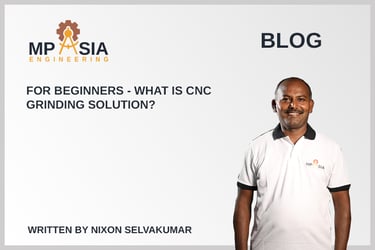

For beginners - what is CNC grinding solution?
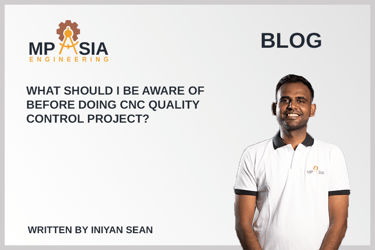

What should I be aware of before doing CNC quality control project?
Related Blog Articles
Looking For CNC Precision Engineering Service? Get A Quick Quote!
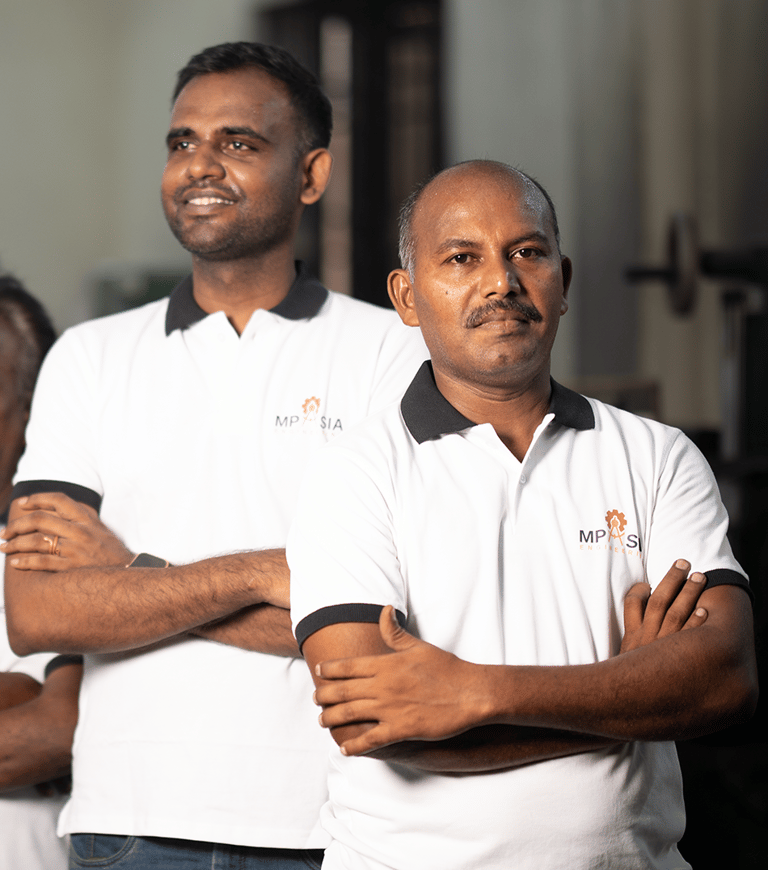

We have dedicated account managers that are available from Mon-Friday, 9am to 6pm SGT. Do fill out this form and we will get back to instantly.
Dedicated Account Manager
24 Turnaround For One-Off Prototype
Parts Delivered OTIF After Confirmation
From Singapore To World








